- Home
- Leslie Meier
Wicked Witch Murder Page 8
Wicked Witch Murder Read online
Page 8
“Good morning,” said Lucy. “Did you sleep well?”
“After I woke you and got Rebecca’s solution,” said Diana, lowering the paper and revealing her completely healed face.
“The poison ivy is gone from your face!” exclaimed Lucy.
“From everywhere,” said Diana. “All gone.”
“That’s amazing,” said Lucy, pouring herself a cup of coffee. She carried it over to the table and sat down, then took a sip. “I really can’t believe it,” she said.
“Neither can I,” admitted Diana. “I never had a spell work that completely before.”
“Are you sure it was the spell?” asked Lucy, eyeing the half-empty bottle of Rebecca’s solution.
“I wish I knew,” said Diana. “Whichever it was, it was some powerful magick.”
Lucy took another swallow of coffee. She was happy for Diana—she was glad the poison ivy was gone—but she didn’t like the way it went. She would have been a lot happier if Diana had just taken the cortisone pills the emergency room doctor prescribed. That was a cure she understood, created by scientists and tested in clinical studies, and much preferable to spells and incantations and bottles of mysterious healing solutions.
“Now that you’re better,” said Lucy, “I suppose you’ll want to get back to your own place.”
Diana’s expression was serious. “Last night, when I couldn’t sleep, I went through my mail,” she said. “It was pretty scary, and I was wondering if you’d mind very much if I stayed a little bit longer? I know it’s an imposition, especially with the cat, but I’ll keep him in my room, with me.”
Lucy did mind. She’d really had enough of Diana. But how could she send the woman away when she needed protection? She’d read the letter; she’d seen the pentagram painted on the door. “You can stay,” said Lucy slowly, “on one condition: that you go to the police and show them the letters and tell them everything you know about Malebranche.”
“I’ll have to think about that,” said Diana, rising and leaving Lucy alone at the table. The bottle of Rebecca’s healing solution was still there, and Lucy picked it up and unscrewed the cap, sniffing it. It didn’t have any smell. She tipped the bottle and poured a drop or two on her hand, discovering it wasn’t greasy, and it didn’t sting. It felt like nothing more than water.
More puzzled than ever, she screwed the cap back on and left the bottle on the table. It was getting late and she had to get to work.
Chapter Eight
The rain was really getting to be a pain, thought Lucy, letting the door slam behind her and dashing to the car, splashing through an enormous puddle that stretched from the back porch steps to the driveway. She was damp and uncomfortable as she started the engine, but that wasn’t the only thing bothering her. Friends of Animals day camp had been canceled again because of the weather, which meant the girls were home alone with Diana. Diana had promised not to discuss witchcraft with the girls, but that sudden poison ivy cure was pretty spectacular, and she wouldn’t be surprised if they pestered Diana until she gave in. On the other hand, she finally concluded as she eased into an empty parking spot right in front of the newspaper office, if Diana could cast a spell to end the rain and bring the sunshine back, she was all for it.
Once inside, she shook out the umbrella, hung her rain jacket on the coat rack, and clomped to her desk. Today it seemed too much effort to take the boots off; the cool but muggy weather made her feel as if she had a fever, both overheated and chilled at the same time.
“Have you heard the forecast?” she asked Phyllis, who was working her way through a big stack of press releases. “When’s the rain supposed to stop?”
“Not anytime soon,” said Phyllis gloomily. “It’s getting me down.”
“Tell me about it. There’s no day camp again today, and the girls are home with Diana.”
“It can’t be much longer,” said Phyllis. “She must be on the mend by now.”
“She’s cured.”
Phyllis’s eyebrows, actually thin penciled lines, rose above her colorful harlequin reading glasses. “No way!”
“She did a spell,” said Lucy. “Last night. And this morning her skin is perfectly clear, like she never had poison ivy at all. Though I have to say, she also used some stuff Rebecca Wardwell cooked up. Whichever it was, she’s all better.”
“So how come she hasn’t gone home?” asked Phyllis.
“She’s afraid. This whole Malebranche thing has really shaken her up, and she’s been getting some dreadful hate mail.”
“Goes with the territory, if you ask me.” Phyllis sniffed. “If you advertise yourself as a witch, you have to expect that some people aren’t going to approve.”
“The letters were really nasty,” said Lucy, booting up her computer. “I can see why she doesn’t want to be alone, even though she did cast a protective spell.”
“If you ask me, Lucy Stone, I think she’s got you bewitched.”
“Maybe,” admitted Lucy. “I’m not a complete push-over. I told her she can stay only if she tells the police everything she knows about Malebranche.”
And just then, almost as if Diana had picked up her thoughts, the phone rang. Diana was ready to play Let’s Make a Deal.”
“Lucy, I want you to know that I really appreciate everything you’ve done for me. I know I’m being a big baby, but those letters really scared me, and I’d like to stay with your family a bit longer, but it would be a violation of the ordains for me to talk about Malcolm with either you or the cops. You’re really putting me in a bad spot.”
Lucy decided to adopt Phyllis’s line of thought. “This has nothing to do with me. You’re the one who decided to become a witch. And what are ‘ordains’?”
“Ordains are the rules all witches agree to follow. And you’re absolutely right. I made my choice—nobody made me become a witch. But what I could do is give you the name of Malcolm’s assistant—if you let me stay.”
“His assistant?”
“Yeah, he knows everything about Malcolm. He can tell you whatever you want to know.”
Lucy was tempted. The police hadn’t released much information about Malebranche, and this could be a real scoop. She knew Ted would want her to go for it. “Just a couple more days, okay? Absolutely no witchcraft with the girls. And you’ve got to keep Piewocket in your room.”
“Oh, I will, I promise. Thank you so much! You’re a sweetie!” enthused Diana.
Lucy knew she wasn’t doing this because she was a sweetie; she wanted to get the story. And she was uncomfortably aware that Bill was getting tired of having a houseguest. Just this morning, he’d been muttering about fish and company stinking after three days. “The name?” she asked.
“What name?”
“The name of Malcolm’s assistant,” hissed Lucy, somewhat irritated. “That’s the deal, right?”
“Oh, yeah. It’s Peter, Peter Symonds, and he lives over in Northboro, near the river.”
Lucy was jotting down directions to Symonds’s place when Ted arrived, dressed in full foul-weather gear. “I’ve been out at the river with the fire chief,” he said, removing his sou’wester and setting it on top of the coat rack. “If this rain doesn’t stop soon, we’re going to get some flooding. Even the creeks are rising.”
Lucy thought of Scorton Creek that ran near her house but decided it couldn’t possibly be much of a threat. After all, the last time she’d crossed the bridge, it had been little more than a trickle. “I’ve got a lead on Malcolm Malebranche,” she said, watching Ted unzip his yellow slicker. “His assistant.”
“You could do a phone interview,” suggested Ted when Lucy pushed back her chair and grabbed her bag.
“I think face-to-face would be better,” said Lucy, slipping into her jacket. “And this way I can take him by surprise.”
“Or you can waste a lot of time when it turns out he isn’t home,” said Ted, but Lucy was already out the door.
It was a fair distance to Northboro, and Lucy
had to keep slowing to cautiously inch around the big puddles that were forming over every storm drain and low spot. It was warm and dry in the car, the wipers kept up a steady beat, and she had the radio switched to an oldies station. This was the part of her job that she liked best: tracking down a story that nobody else had. As she drove along, she was thinking of the questions she wanted to ask Symonds and the best way of posing them.
She found his house without any problem, thanks to Diana’s directions, but there was no answer when she knocked. For a moment, she feared Ted’s prediction that Symonds probably wouldn’t be home was true until she noticed a car in the driveway and decided to try the back door. Maybe he was in the shower or had the TV on and couldn’t hear her knocking. When she went around to the rear of the house, she spotted him, as thin and awkward as a scarecrow, standing in the backyard and watching the river, which was overflowing its banks and rising.
“I’m Lucy Stone, from the Pennysaver,” she yelled, approaching him through the downpour and pulling her camera out of her bag. “Mind if I take some photos?”
“See that stick?” he yelled, pointing at a little nubbin poking out of the water about twenty feet from the water’s edge. “That’s where the water was when I woke up this morning, about four hours ago.”
“Oh, my,” exclaimed Lucy, checking the distance from the water’s edge to the house, about fifty feet with a gentle slope. She raised the camera and framed her shot, featuring Symonds pointing to his stick. As she snapped the photo, she realized she recognized him: He was one of the members of the coven who had been rescued by helicopter, the guy with the prominent nose and receding chin.
“Hey!” he protested. “I didn’t say you could take a picture.”
“Oh, sorry,” she said, lowering the camera and deciding to play it cool, leaving her reporter’s notebook in her bag. “Do you have flood insurance?”
“No,” he replied. “It’s never done this before.” He was wearing fisherman’s waders and a camouflage slicker, and the rain had plastered his long, dark hair to his head. It wasn’t a good look, emphasizing his rather large nose, small chin, and splotchy skin. “I suppose all this rain is a big story?”
“It is,” said Lucy. “I’d love to interview you about it. Do you mind if we go inside?”
“I can’t talk long. I have to start moving my stuff upstairs,” he said, giving her a funny look. “Do I know you?”
“I get around, because of my job,” she said, following him into the little bungalow. Once indoors, she saw the furniture and decor were dated, as if he’d inherited the house from an elderly relative. Interviewing him about Malcolm Malebranche wasn’t going to be hard—a box full of posters and magic equipment was on a chair by the door. “Are you a magician?” she asked.
“I was Malcolm the Magnificent’s assistant,” he said.
“Why’d you stop?” asked Lucy, watching as he knelt down and began gathering books and photo albums from a bookcase and packing them in a cardboard carton.
“He died unexpectedly.”
“I heard about that,” said Lucy. “Were you close?”
Symonds shrugged, dropping a couple more books into the box. “We worked together for six years.”
Looking around the place, which had a forlorn air, Lucy suspected it hadn’t been a very lucrative arrangement. “Want me to carry this upstairs?” she asked, indicating the collection of memorabilia.
Symonds again gave her a funny look, a sideways glance, that made her regret her offer. “If you want,” he muttered, sounding as if he was doing her a favor.
Lucy was halfway up the stairs when she heard Symonds behind her and found herself stepping a little quicker. She went into the first room she saw, a bedroom with a dingy chenille spread covering the sagging bed, and set the box on a tall dresser. “The water can’t possibly rise this high,” she said, turning to face him with an encouraging smile.
Symonds was staring at her, and she could practically see the lightbulb above his head switching on. “You were there, when we got off the mountain.”
“Like I said, I’m a reporter. I get around.”
“And you’re here because of the storm?” he asked in a sarcastic tone.
“Well, yes, and I also wanted to ask you about Malcolm,” said Lucy, perching uneasily on the edge of the bed and trying not to look as nervous as she felt, alone with him in this bedroom that was straight out of a horror movie. “The medical examiner thinks he died practicing some sort of Houdini-style escape trick.”
Symonds sat beside her, leaning his hands on his knees and panting, and she resisted the urge to edge away from him. Up close, she decided he didn’t look too healthy. He was very thin and his cheeks were sunken. “That’s crazy,” he said, with a hollow cackle of a laugh.
“Why do you say that?” asked Lucy.
“Have you ever seen the show?” demanded Symonds.
“I don’t think so.”
“Well, it was for kids. He pulled a lot of coins from behind little kids’ ears. He made bunny rabbits disappear and come back again, stuff like that. When the routine was over, we made balloon animals for the kids.”
Suddenly Lucy knew exactly who Malcolm was. She’d seen his show a number of times, performing at school fairs and church festivals. The kids were always amazed, the parents less so, despite the black cape lined with red silk and the top hat Malcolm always wore.
“We better get the rest of the stuff,” said Lucy, standing up. “Well, what do you think happened if it wasn’t a trick? Did he have any enemies?”
“Not that I know of, and that’s what I told the cops. The state police were here and asked a lot of questions,” replied Symonds, letting out a big sigh and standing up. “I don’t like to think about it. I like to remember him the way he was before a show—you know, up and excited. He never lost that, no matter how many shows he did.”
“Do you think he was burned because he was a witch?” asked Lucy, following him down the stairs.
Symonds turned and faced her. “Where’d you hear that?” he demanded angrily from the bottom of the stairs.
Lucy hesitated. She wasn’t about to identify Diana as her source. “Around,” she said with a shrug. “You know how these rumors get started.”
“Well, that’s just what it is, a rumor!” declared Symonds, opening the front door at the bottom of the stairs. “Thanks for your help. I can take it from here.”
Lucy tried one last, desperate measure. “I was there at the helicopter rescue. I know you’re a member of the coven, that you were all on the mountain to celebrate Midsummer Night.”
Symonds laughed hollowly. “That’s a good one. Me, a witch.”
“This act of yours isn’t very convincing,” said Lucy. “And it’s not going to help find Malcolm’s killer either.”
“Right now, all I’ve got on my mind is this flood,” said Symonds. “If I were a witch, why wouldn’t I just cast a spell and make the water go back, huh? Answer me that.”
“Because witchcraft doesn’t work like that,” said Lucy.
“How do you know?” he demanded, narrowing his eyes. “Are you a witch?”
“I’ve done some research,” said Lucy.
“It’s time for you to go,” said Symonds, reaching around her and grabbing the door, leaving her nowhere to go except outside.
“If you change your mind, just call me at the Pennysaver. Ask for Lucy.”
“Don’t hold your breath,” said Symonds, slamming the door behind her.
The trip hadn’t been a complete loss, thought Lucy as she drove back to the office. She’d gotten some good quotes and photos of the flood, and she’d gotten some good background on Malcolm the Magnificent. A lot of people would be shocked and surprised to learn that he was the victim of the burning in the woods; almost everyone in the area had seen his little magic show. It was too bad she hadn’t dared to ask Symonds for a photo of Malcolm the Magnificent, but she was hopeful they had one on file.
As for
Malcolm being a witch, well, that was a sensational twist that would certainly have surprised the folks who took their little ones to see his show. But she hadn’t gotten either Diana or Symonds to admit that on record, so she couldn’t print it. She could tell the police, however, and that’s what she was planning to do when her cell phone rang. She pulled over to the side of the road to take the call. Sometimes she did talk and drive, but not today, when the roads were so treacherous.
“Mom!” wailed Sara.
Lucy imagined the worst: The puddle had spread; the kids were marooned in the house, which was going up in flames thanks to one of Diana’s black candles. “What’s the matter?” she asked.
“We’re over at Abby’s, and her mom fainted or something. What should we do?”
Lucy remembered how frail Abby’s mother, Miriam, had appeared at the neighborhood cookout. “Get her head lower than her feet,” she advised.
“She’s flat on the floor,” said Sara, “and she doesn’t seem to be coming around.”
“Call the rescue squad,” said Lucy.
“Abby says we can’t do that or her father will kill her. It’s against their religion or something. Can you come, Mom? Please.”
“What can I do? Call the rescue squad!”
“Mom, you gotta come. I’m really scared and Abby is freaking out.”
“All right, I’m on my way.” She was about to end the call when she remembered that Victorian ladies kept smelling salts on hand for their frequent swoons. “Try putting some ammonia on a tissue and holding it under her nose,” she advised.
“Where would we get ammonia?”
Oh my word, thought Lucy. What was she raising? Idiots? “With the cleaning stuff. Under the kitchen sink, in a broom closet, someplace like that. Abby will know.” Unlike her own daughters, who didn’t seem to have a clue, she thought as she navigated around a small lake that had formed in the road. She was pretty sure none of her children could locate a light switch in the house they had grown up in, even if their lives depended on it, and they also had no clue how to operate a window shade or open a window. She had often come home from work to find them sitting in dark, stuffy rooms, mesmerized by the TV.

 Christmas Card Murder
Christmas Card Murder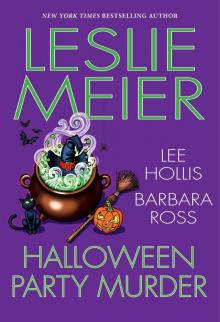 Halloween Party Murder
Halloween Party Murder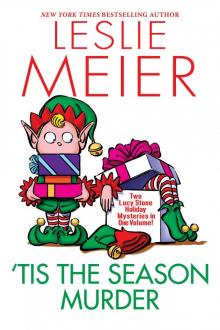 'Tis the Season Murder
'Tis the Season Murder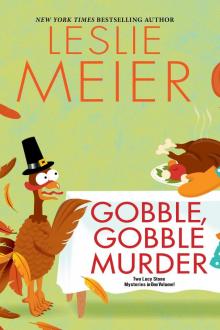 Gobble, Gobble Murder
Gobble, Gobble Murder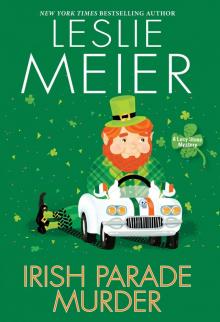 Irish Parade Murder
Irish Parade Murder Bake Sale Murder
Bake Sale Murder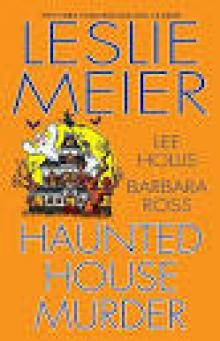 Haunted House Murder
Haunted House Murder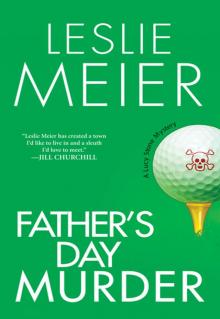 Father’s Day Murder
Father’s Day Murder Chocolate Covered Murder
Chocolate Covered Murder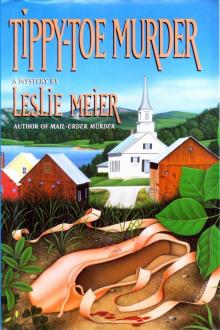 Tippy Toe Murder
Tippy Toe Murder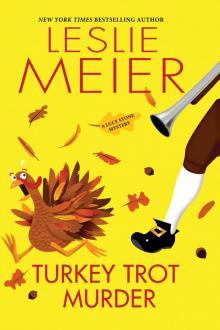 Turkey Trot Murder
Turkey Trot Murder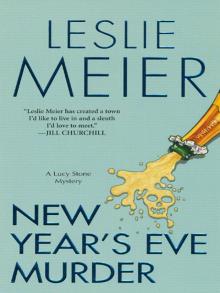 New Year's Eve Murder
New Year's Eve Murder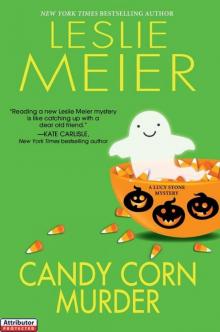 Candy Corn Murder
Candy Corn Murder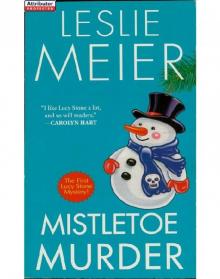 Mistletoe Murder
Mistletoe Murder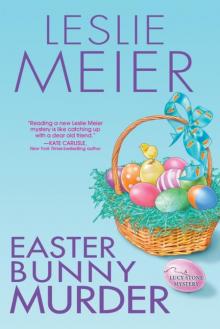 LStone 20 - Easter Bunny Murder
LStone 20 - Easter Bunny Murder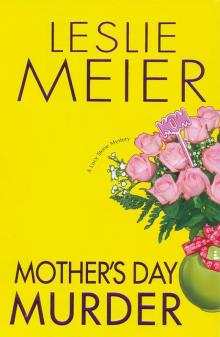 Mother's Day Murder
Mother's Day Murder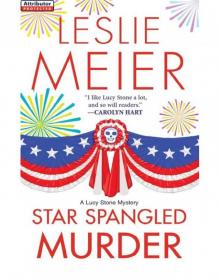 Star Spangled Murder
Star Spangled Murder Silver Anniversary Murder
Silver Anniversary Murder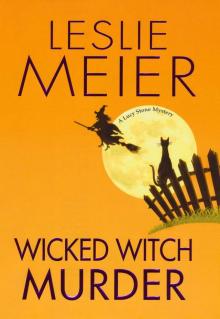 Wicked Witch Murder
Wicked Witch Murder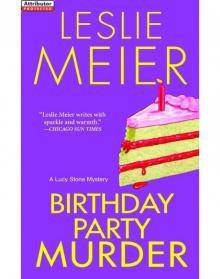 Birthday Party Murder
Birthday Party Murder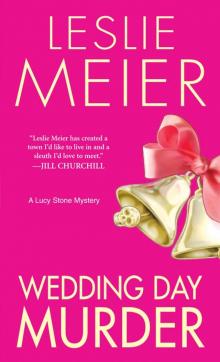 Wedding Day Murder
Wedding Day Murder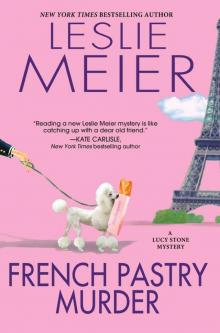 French Pastry Murder
French Pastry Murder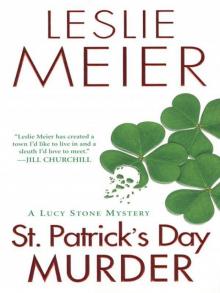 St. Patrick's Day Murder
St. Patrick's Day Murder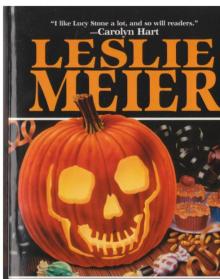 Trick or Treat Murder
Trick or Treat Murder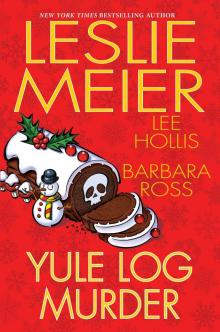 Yule Log Murder
Yule Log Murder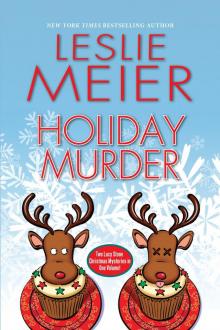 Holiday Murder
Holiday Murder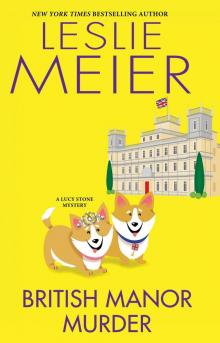 British Manor Murder
British Manor Murder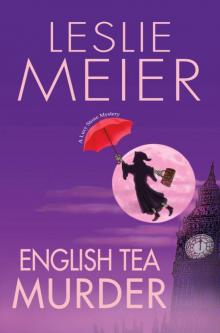 English Tea Murder
English Tea Murder